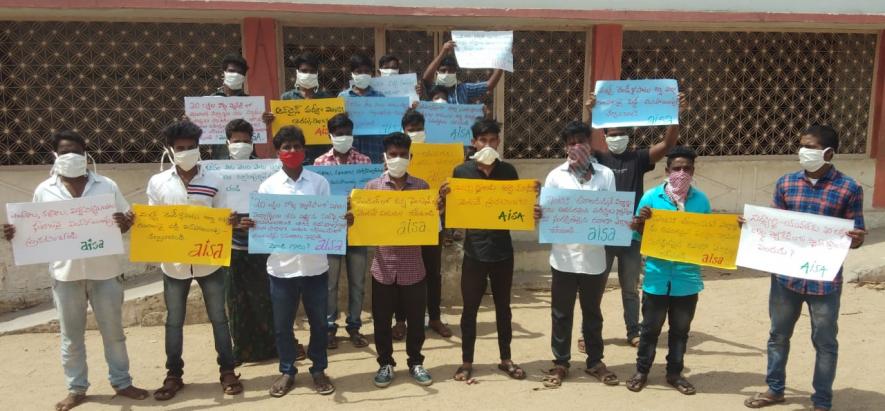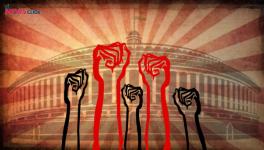Students’ Unions Protests Against Modi Govt’s ‘Exclusionary’ Agenda

The Narendra Modi-led central government seems to be hell bent upon turning the pandemic crisis into an opportunity to push forward a slew of measures. In the education sector, educationists and students’ bodies fear a move that “will compound the exclusion of marginalised, economically weaker sections from the learning ecosystem”. Initiatives including digitalisation and centralisation of knowledge—that have been in the pipeline for years—are now being rushed by the Centre under the garb of overcoming novel coronavirus-posed challenges, activists have alleged.
What’s worse, according to them, is that it is happening when concerns of students, who are reeling under the weight of an unplanned lockdown, went almost unheard.
“There are around 300 students currently staying in the campus hostels because their native places fall under the red zones—meaning it's not safe to go back home,” said Abhishek Nandan, president of students’ union at University of Hyderabad.
Despite knowing this, the university administration has been pressuring the students to vacate the hostel rooms, Nandan alleged.
Many students have left the campus also because the administration has not ensured adequate protective measures. “The mess workers are still not provided with safety gears. It was only after protest from students’ union that workers are now being thermally screened at the campus gates,” he added.
Across the country, students faced with a lockdown are in no better condition. Reports suggest that desperate students are having to shell out hefty amounts to reach their homes, even after their movement was allowed by the Centre, through a circular issued on April 30.
“We are looking at an unprecedented crisis. Millions of students and their education are being affected. Despite this, the Centre has only ‘zeros’ to the student community in its [Rs.] 20 lakh crore package,” N Sai Balaji, National President of All India Students Association (AISA) told NewsClick.
The Modi government has turned its back on the financial hardships of the students, according to him. “The students are not receiving their fellowships on time. There is no economic security. Ignoring all this, the government is pushing for online education,” Balaji added.
On May 17, Union Finance Minister Nirmala Sitharaman announced expansion of e-learning in higher education, under which online component in conventional universities will be raised from existing 20% to 40%.
In addition, she also announced a digital initiative, namely, “one nation, one digital platform” and “one class, one channel” in a bid to ensure that education material reaches students present in the farthest areas of the country.
Contrary to the Centre's claims, educationists have, however, raised concern, saying that the moves will lead to further “corporatisation” of the Indian education that will be dictated by the forces of global capital.
“Online education’s core agenda is to enslave young minds and dehumanise society,” says Anil Sadgopal, a renowned education activist, “it will homogenise the knowledge that India exhibits through its diverse society and cultures.”
Who will be the first to get affected by this homogenisation process? Sadgopal answers that it will inevitably be the marginalised communities including the SCs, STs, OBCs and Muslims. “The already vulnerable groups will be further excluded from the education system and thus will be pushed to provide cheap labour to industries that are devastated by the outbreak of coronavirus.”
According to him, the recent initiatives in the education sector must be seen in a “larger perspective” to revive the economy by “benefiting” the corporate lobby at the cost of the students.
To register its protest against such moves, students across the country took to social media with placards on Wednesday. Led by All India Forum to Save Public Education—a coming together of students’ unions that cut across political affiliation—students demanded immediate cash transfers and a waiver of three months’ college fees.
Also read: Is it the Beginning of the End for the Neo-Liberal Era?
Get the latest reports & analysis with people's perspective on Protests, movements & deep analytical videos, discussions of the current affairs in your Telegram app. Subscribe to NewsClick's Telegram channel & get Real-Time updates on stories, as they get published on our website.
























